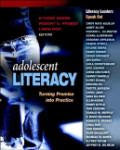I could identify with Don Murray's article because I too believe in writing with my students
and the importance of surprise and discovery. I have enjoyed the editors' margin notes
and their comment on page 186 that Don's idea of one assignment for an entire semester
may work better for older students. "Writing is rewriting" and there are many ways to
use this in the classroom. I find distance importance. If I put my own writing aside for awhile
and revisit it, I am more objective and can edit and revise more easily. I try to build this into
my class assignments, sometimes collecting drafts and letting them cool for a few days or weeks, returning them with suggestions or options, or asking students to share with other writers they trust. Asking students to take the same writing and drastically reduce or expand, or take another perspective or time, exploring the same piece in three different genres, works well, too. I particularly liked Sandra Cisneros' statement at the end, about allowing someone to see you in your PJ's and writing in that voice about what makes you different. So honest. When students write what matters to them, the real writing happens. I will be looking for his two other books (and was saddened at the mention of his passing). This is why I like anthologies. They serve as
introductions, like samples at a buffet.
I was amused in the introduction that the editors would point out the features of this book and how to read it. But I do find that the margin notes like hypertext links enable vital connections esp. when reading chapters in order of interest, which this book welcomes. So, when I read Tom Romano's Chapter 11, Teaching Writing from the Inside, he reinforced the idea of surprise and discovery, the need for writing to be as natural as "slipping on sandals" or "taking the canoe up the wilderness river. " I have listened to stories told by men who never graduated from high school and been captivated by their language and imagery, by their honesty. Everyone has a story and a voice. When Romano ends with the story of his father calling, it all fits perfectly.
He does practice what he promises. Writing what matters most engages students and provides
personal investment. I have students include "writer's comments" to provide insight into the
process. I have learned so much from these. I suppose they are similar to Harvey Daniels'
letter strategy in Chapter 9. I remember one student who wrote a poem about the perfect
day fishing with his father. There was nothing remarkable about it but in his comments he
wrote that this was fiction, that his father never spent time with him and that his neighbour
taught him how to ride a bike while his father drank beer and watched TV inside the house.
It was a very special poem. When Romano includes the poem his friend wrote, it parallels
the piece he wrote about his father. It is the calling for the dog, for the child, and the need
for patience, for listening, for seeing. It is writing from the heart that matters.
Subscribe to:
Post Comments (Atom)

4 comments:
I thought that Don Murray's advice about writing just one paper per term was interesting. It certainly would cause students and teachers to slow down the process and have time to do some real, authentic revision. One of the teachers in the traits project did something like this - she sent a paper back several times, having the students revise for each of the traits. She got a lot of complaints from her students and one from a parent! However, students did see that at the end they had written a far superior piece. Again I think that we are trying to do too much. I'm trying right now to re-vision grade 9 and 10 English classes. Based on what we have read so far, what would it look like?
Yes, perhaps we are trying to do
too much. With the Writer's Craft
course the students revise pieces
during the semester for their
final manuscript. It is an ongoing process and it works well.
Other classes don't seem to offer
the same opportunities. I like that students are engaged and
play a more active role in their choices of reading and writing material. Still, part of education is having someone teach an
appreciation of
Shakespeare and some of the other
classics so that you do have
background knowledge. How do you
see it?
I'm in agreement that students need an appreciation of Shakespeare and other excellent writers. I guess the question is really how do we meet the needs of students who are coming to us without strong basic literacy skills in reading and writing? Can we address the needed skills along with the content of the traditional English class? This is what I am struggling with - what does this look like?
It means using more literacy strategies, allowing more thinking
and writing, getting rid of Chapter
questions and lengthy overhead notes,
making the classroom a daily
invitation to explore what is
important.
Post a Comment